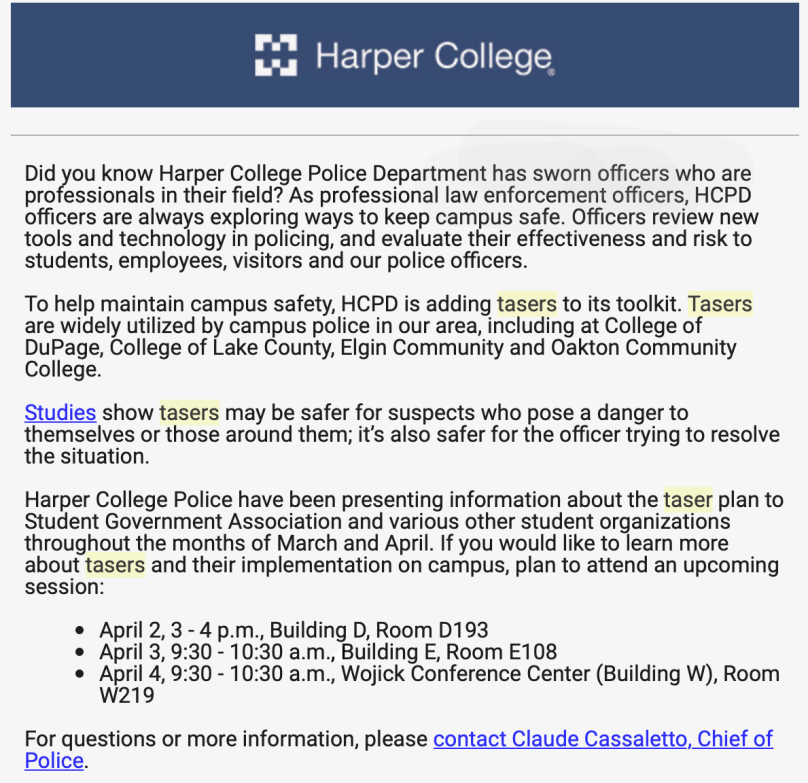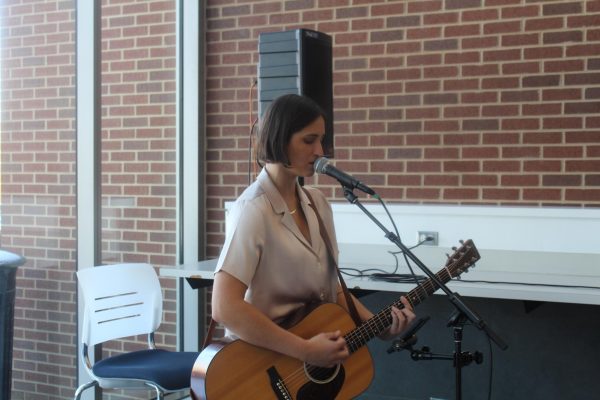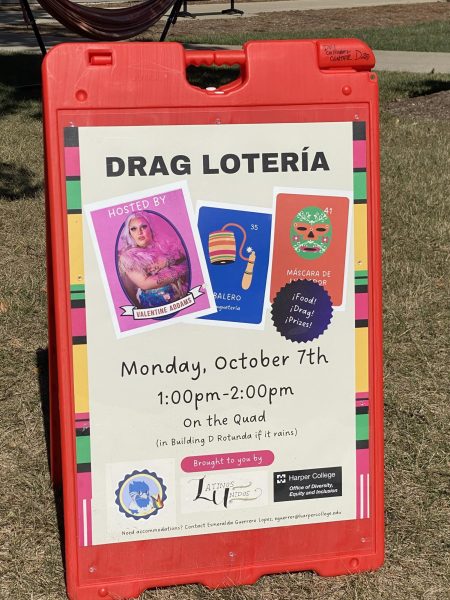Harper College Police Department Will Adopt Tasers This Summer
In addition to pepper spray, batons, and handguns, officers of the Harper College Police Department will soon carry Tasers, according to an email that Harper sent out on March 21 to all students, faculty, and staff.
This will go into effect in July, said Kimberly Pohl, Manager of Media Relations and Legislative Affairs at Harper.
This idea was first proposed in March 2018 by HCPD Chief of Police Claude Casaletto soon after he was first hired at Harper.
“One of the first things I did as police chief was looking at an assessment of our needs,” Chief Casaletto said, “and one of the first things I noticed was that our police officers did not carry Tasers.”
Harper is one of the last schools in the area to implement Tasers, according to Ronald Ally, Executive Vice President of Finance and Administrative Services at Harper. Ally played a large role in facilitating Chief Casaletto’s proposal.
“When the chief came to me with the initial recommendation, I put a lot of weight in what our peer schools are doing,” Ally said. “I had him check with the other schools and, surprising to me, we were the only ones without Tasers. So all the other peer schools had them already. Seems like we were a little bit behind the time.”
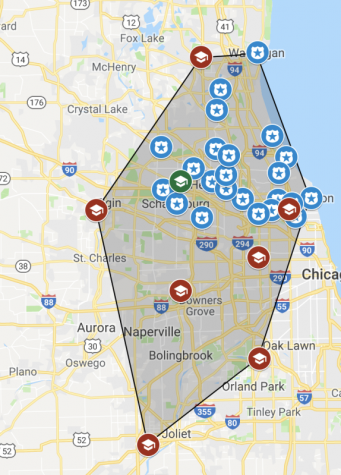
Chief Casaletto believes Tasers to be “the thing of the future” and necessary addition to Harper officers’ arsenal. Tasers are a safer means for dealing with dangerous individuals than handguns, Casaletto claimed.
“Before Tasers, we had no intermediary type of weapon to use in a situation,” Chief Casaletto said. “So handgun or nightstick isn’t really two good choices when you’re trying to mediate a situation. When the Tasers came out, it filled the void quite nicely.”
Some students, including Takuya Miyaishi, have expressed surprise regarding HCPD’s implementation of Tasers.
“I feel like doing something like this would have had to come after a serious incident. I never heard of any serious incident,” Miyaishi said.
Another student, Joel Hufano, expressed similar feelings.
“I guess it’s better to be safe than sorry, even though I haven’t heard of any trouble here at Harper,” Hufano said.
Ally confirmed that this is a safe campus and a safe environment with very few issues that would require aggressive confrontation. The goal of the Tasers is to keep it that way, he added.
Chief Casaletto said, however, that there have been multiple occasions where a Taser could have been utilized since he began working at Harper.
“As you know, this is an open campus. Anybody can come in off the street, or anybody can get off the bus and walk in. And one gentleman did that and caused a little problem,” Chief Casaletto said, describing a scenario in which a Taser would have been handy. “He had a criminal history of fighting with the police and enjoyed fighting with the police. So those are the people that are highly motivated and not just scared of the mere presence of my uniform or me. They really don’t care about that.”
According to Chief Casaletto, HCPD officers will have to go through specific training in order to carry a Taser.
Held by Taser International, Inc. (now called Axon Enterprise, Inc.), the training is two days of classroom instruction and one day of firing the Taser. All officers must requalify and retrain each year in order to carry a Taser, as well as pepper spray, a baton, and a firearm.
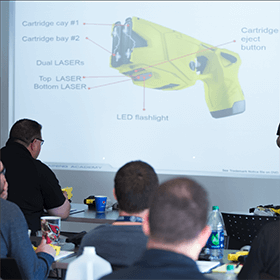
Chief Casaletto acknowledged that there are medical dangers involved with Taser usage, but said that the training mitigates those dangers.
“There are certain target areas they try and tell you to stay away from, which we learn in training,” Chief Casaletto said.
In March, Chief Casaletto visited the Student Government Association to address concerns regarding the implementation of Tasers, according to Student Body President Alex Valladares.
Their first concern was that HCPD officers might overuse the Tasers now that they have this new tool.
“I don’t want the officers to feel like they need to use the Taser just because they have one now,” Sheaon Konno, another Harper student, added. “I’m concerned of the possibility that some school officers may lack the proper training and may rely too much on the Taser.”
But Chief Casaletto assured that along with Taser training, officers will also have to go through de-escalation training. This was another change that Chief Casaletto implemented upon his arrival at Harper.
“The officers here are now trained to, instead of having to resort to Tasers or pepper spray, know the proper steps to de-escalate a situation,” Valladares said. “This is really important because a lot of police departments don’t even have that.”
Another concern raised by SGA was the fact that HCPD officers do not have body cameras. If a person was injured, there would be no way of knowing if the excessive force had been used, Valladares said.
Chief Casaletto quelled this concern by explaining to SGA that the Tasers have a timestamp in them that tracks when the Taser was shot and how long it would have been held down. With this, they will have better insight into whether or not the Taser was misused, Valladares explained.

Students have also noted that Harper should have a better system of communicating important information, especially when it involves changes that may affect their safety. Some students, as well as faculty, said that they were completely unaware of the Taser implementation.
Steven Titus, a professor at Harper, explained that he was unaware of the change, but he expressed a positive attitude toward Harper’s past communication.
“Harper Police have been transparent in their work with faculty and staff in the past to ensure safety on campus,” Titus said.
Soshun Honda, a Harper student, said that he felt Harper could have done more to spread the word.
“I didn’t even realize they sent out an email about this,” Honda said. “I feel like most kids just gloss over the school emails or don’t even look at the emails at all, but that’s just personal opinion.”
The email that Harper sent out about the Tasers also included information about three open forum sessions that occurred early last April. These sessions were an opportunity for students, faculty and staff to hear a presentation by Chief Casaletto and to voice any concerns.
“Unfortunately, one of my open forum sessions nobody showed up to,” Chief Casaletto said. “The second one I had only three or four show up, and the last one I had about ten.”
Ally added, “I might interpret that as fortunate that people are really not that concerned about this.”
Some students, including Honda, mentioned some communication tools the school could someday utilize.
“I think that the school should have school-related announcements, like the club flyers, somewhere where there is high traffic of kids,” Honda said. “They could even invest in something like a digital flyer, like the one in front of the school.”
In light of the various concerns, students and faculty seem generally accepting of HCPD’s decision to utilize Tasers.
“I’m 100 percent for it because it’s a less lethal weapon that officers can use to de-escalate situations that don’t require them to use deadly force,” said Jin Young Kuroha, a Harper student who works as a security guard at a local store.
Titus shared similar thoughts on the matter.
“Any opportunity to remove the use of lethal force with handguns in a difficult situation (outside the clear danger of an active shooter) needs to be implemented,” Titus said.
Honda, who actually expressed surprise that HCPD officers didn’t already carry Tasers, conveyed an attitude of trust toward Harper and its police department.
“I feel like the school does care for my safety and also the safety of the person being seized,” Honda said. “So I’m okay with the decision.”


